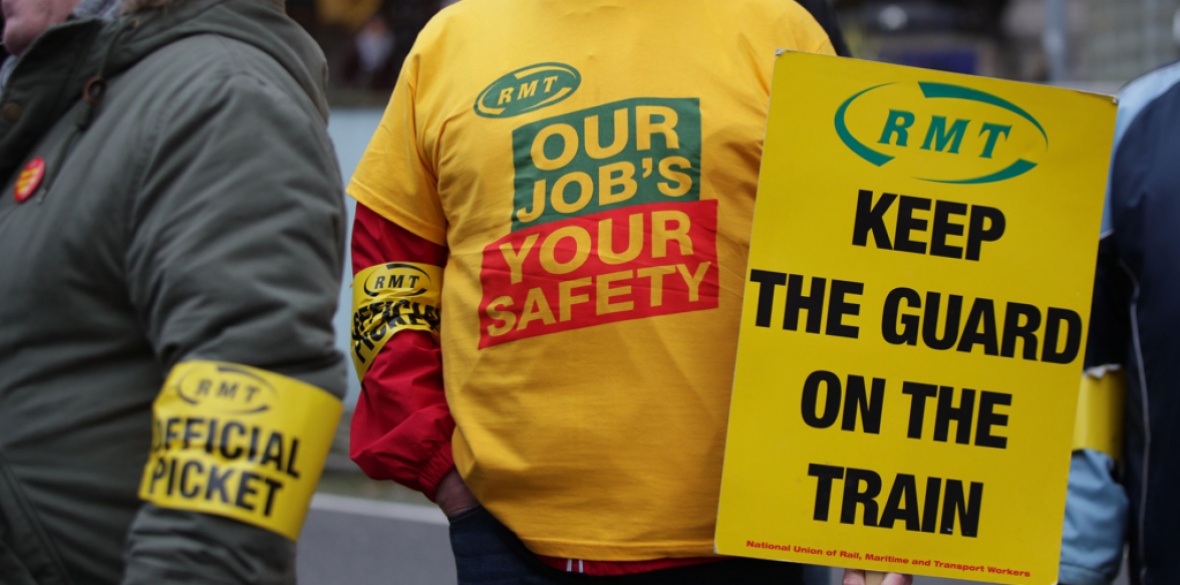This is the last article you can read this month
You can read more article this month
You can read more articles this month
Sorry your limit is up for this month
Reset on:
Please help support the Morning Star by subscribing here
DISABLED People Against Cuts activist Doug Paulley’s praise for train guards who have been in dispute for more than two years over their safety-critical role should be broadcast far and wide.
Guards, like platform staff, are often on the front line when the incompetence and greed of the rail privateers result in delays, cancellations or overcrowding.
This means they regularly have to deal with crowds of exasperated passengers — situations that can become unsafe, as Govia Thameslink Railway’s (GTR’s) pathetic briefing to staff on how to “de-escalate” tense exchanges indicates.
At unstaffed stations, guards are essential to allow disabled passengers to board and disembark, as Paulley points out when he notes that many supposedly accessible stations are nothing of the kind.
Companies whose only concern is how large a profit they can milk from each franchise are indifferent to disabled people’s right to travel — as we saw when GTR told staff last month not to help disabled passengers board if it risked delaying the service.
Such discrimination is a breach of the Equality Act and an outrageous affront to passengers who have as much right to travel as anybody else.
“When things go wrong … that’s when guards are incredibly important to me,” Paulley says, citing anti-social behaviour as one risk passengers run where the presence of a guard makes all the difference.
Years of Tory ministers like George Osborne mouthing poisonous drivel about scroungers “sleeping off a life on benefits” has seen hate crimes against disabled people increase dramatically.
The 53 per cent rise in disability hate crimes recorded by the Home Office last year came on top of a 40 per cent rise reported in 2016, and both figures represent a bigger increase than that recorded for any other kind of hate crime. Even these grim figures pale in comparison with the surge in hate crimes directed at disabled children, which rose 150 per cent between 2015 and 2017.
Anti-social behaviour on trains will be a particular worry for disabled travellers, but crime is rising on public transport in general: British Transport Police recorded an 11 per cent rise in violent attacks on trains and London Underground services last year.
Common sense tells us these attacks are less likely — and will be easier to deal with — with a guard on the train.
That’s without even going into their essential role in evacuating a train in the event of an accident.
Why, then, the fixation on removing guards that seems to be shared across multiple rail operators?
An obvious answer is that a privatised railway is not run in the interests of either staff or passengers, but of shareholders, and the closer to the bone they can cut running costs the more money there is for dividends. The occasional lethal crash, murder or sexual assault is a price worth paying for these faceless profiteers.
But it’s not the only answer. GTR’s outgoing boss Charles Horton told MPs last week that he was “terribly sad and terribly sorry” about the chaotic state of rail services provided by his firm, which prompted his resignation.
Perhaps he was sorrier about the strength of industrial resistance shown by train guards.
Earlier this year the permanent secretary at the Department for Transport admitted to MPs that bosses had not anticipated “anything like” the scale of strike action mobilised by RMT.
Passenger services managing director Peter Wilkinson moaned that he wished he had “better engagement” from trade unions — this from a man who bragged in 2016: “We have got to break [the rail unions]. They can’t afford to spend too long on strike and I will push them into that place.”
The guards haven’t been broken yet. Their victory is important to us all.











